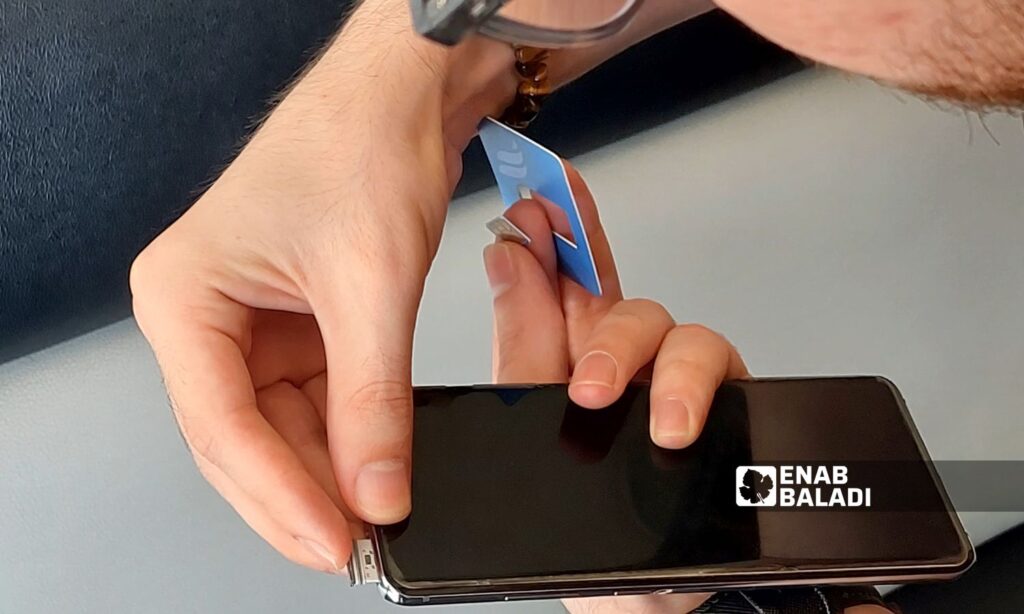Azaz – Dayan Junpaz
In the northern Aleppo countryside, several lines of mobile and internet networks are spread out, belonging to different companies, including the “4G” and “E-lux” networks, in addition to Turkish lines and others.
With the abundance of lines, users find themselves faced with features and drawbacks, the most notable being the discrepancies in costs, coverage, and internet speed across the areas controlled by the Syrian Interim Government (SIG), which drives some to acquire multiple lines.
Internet companies in northwestern Syria (Aleppo countryside and Idlib) rely entirely on service providers from Turkish companies, especially after the Syrian regime cut off communication and internet services to the area following its withdrawal.
E-lux line in dollars
Farouk al-Farouk, the owner of a communication shop in Azaz, told Enab Baladi that the prices of communication lines vary according to the companies and services they provide, as each company has its own advantages and disadvantages depending on user needs.
He added that the price for an E-lux line is 15 US dollars (about 510 Turkish liras), and recharging this line is limited to only one package, priced at six dollars, with no other offers or packages available.
He explained that the limited packages of E-lux may not meet the needs of users who consume large amounts of data, as the only available package provides only 4 gigabytes. Nevertheless, many prefer this line due to its easy availability and the lack of required documents or procedures.
Al-Farouk mentioned that the E-lux network covers most border areas, including the countryside of Aleppo and Idlib, relying on the towers of the Turkish Turkcell network. This enables subscribers to use the line for both internal and external calls, in addition to internet services in most areas, making it a favored option for many residents.
“4G” is more widespread in Aleppo countryside
The lines of the “4G” company are the most requested and widespread in the northern Aleppo countryside due to the lower prices of lines and packages compared to other networks.
The owner of the communication shop stated that the price for the line is about 300 Turkish liras, while the monthly package costs between 100 and 160 Turkish liras, depending on the available data size (gigabytes). The company also offers packages lasting from one to three months at reasonable prices.
Al-Farouk explained that the company offers periodic promotions on packages, making it an attractive option for many users, especially given the deteriorating economic conditions in the area.
Mohammad Wati, a university student in Azaz, told Enab Baladi that he decided to buy a “4G” line after using an E-lux line for some time.
He noted that the new line helped him reduce costs and that it provides multiple options and offers for package recharging, especially since he uses the internet continuously while at university and when he is out, making reliance on the “4G” line more suitable for his needs.
Wati added that the only thing that distinguishes the E-lux line is that it offers coverage in various areas, meaning it can be available wherever he moves.
He explained that the “4G” service is often limited to cities and may not be available in some remote areas. Nevertheless, he considered the company’s service to be generally better in terms of speed, internet quality, and available packages.
Coverage challenges
The disparity in network spread and its availability in some areas while missing in others drives many to seek owning multiple SIM cards, which has become a common practice.
Mohammad Said, a driver working in cargo transport, told Enab Baladi that he relies on the E-lux line due to his constant movement between the Aleppo and Idlib countryside. The network is available in both areas, but he faces difficulties due to the limitation of offers to only one package, which does not meet his needs as a user.
He expressed a desire to replace his line with a Turkish one, but he was unable to obtain it due to the complex procedures required. Therefore, he decided to buy a “4G” line, as obtaining it is limited to providing an identification card issued by local councils only, which made the purchasing process easier compared to Turkish lines that require documents such as a temporary protection card (Kimlik).
The driver added that the “4G” service is only available in areas of Aleppo countryside but is absent in Idlib regions, forcing him to also use an E-lux line when heading to Idlib.
He recharges his “4G” line every three months, while he recharges his E-lux line monthly due to his urgent need for the internet in his work, as he needs to communicate continuously with customers, according to his statement.
“Kimlik” needed to activate Turkish lines
Some users who do not possess a temporary protection card (kimlik) or do not have relatives in Turkey face difficulties in activating Turkish lines like Turkcell and Türk Telekom, as possessing this card is a basic requirement to obtain these lines, according to Ali Arfad.
Arfad, a communication shop owner in the village of Saju in Aleppo countryside, explained that Turkish companies refuse to document numbers using identity cards issued by local councils in Aleppo countryside.
He told Enab Baladi that the price for Turkish lines is 650 Turkish liras, and package costs start from 300 Turkish liras monthly as a minimum, potentially reaching 2000 Turkish liras depending on the package.
He pointed out that in some areas, the Türk Telekom network is available, while in others it is Turkcell, and some areas have no coverage from any company, making it a rare option for users.
Prices for internet packages have seen repeated increases for most lines in northern Syria, alongside severe weaknesses in some internet networks and interruptions in others, latest in July which was caused by an outage from the Turkish side following protests in the region rejecting abuses against refugees in Turkey.

